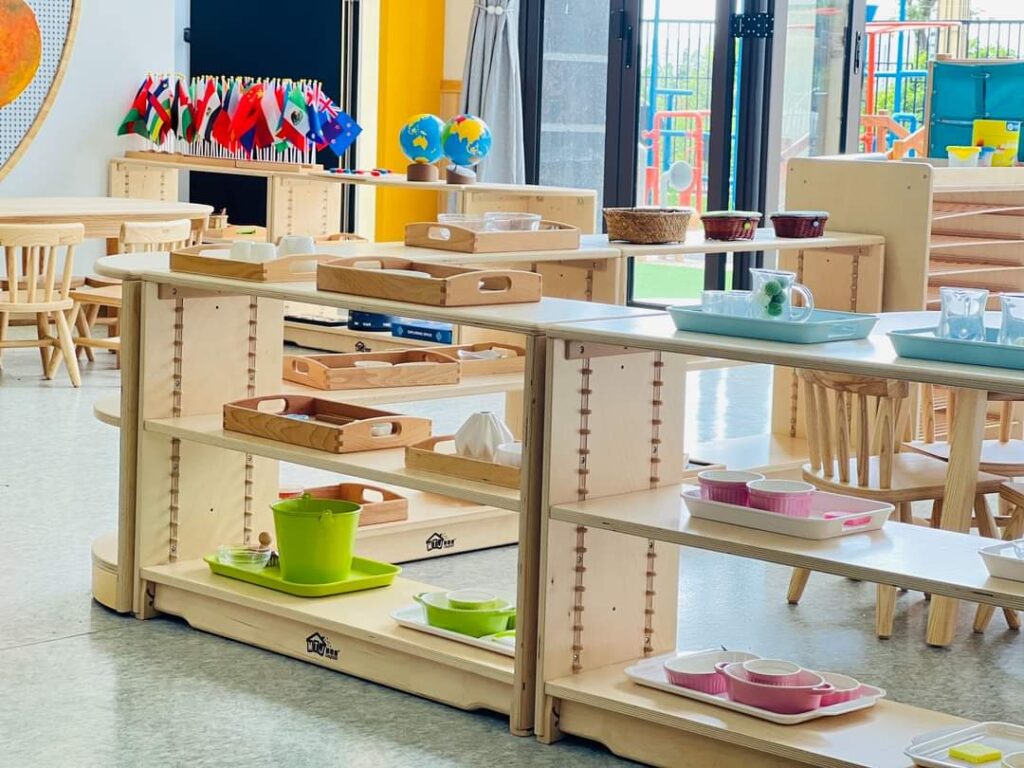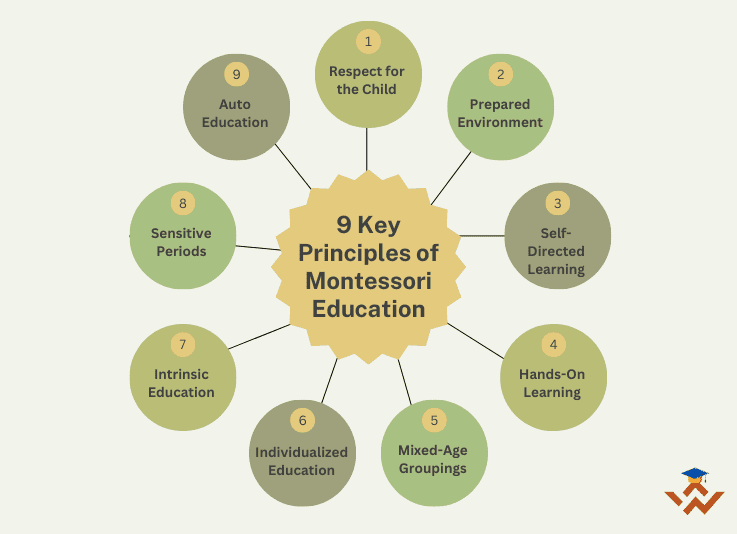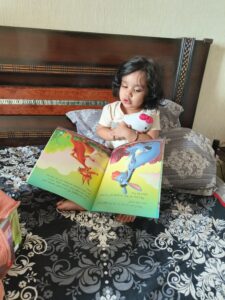Montessori principles stands as a beacon of innovative and child-centric learning method. Rooted in a profound understanding of childhood development, Montessori principles have transformed the way we approach education. Montessori method’s unique approach to education has been gaining popularity in recent years. This method advocates for a child-centered learning environment that emphasizes the importance of independence, freedom within reasonable limits, and respect for a child’s natural psychological, physical, and social development.
“Education is a natural process carried out by the child and is not acquired by listening to words but by experiences in the environment.” — Maria Montessori, “The Absorbent Mind”
Research has shown that Montessori education is effective in helping children reach their full potential. Montessori schools provide a supportive environment to help children develop the skills they need to become lifelong learners. Whether they go on to college or enter the workforce, Montessori graduates are well-prepared to succeed in any field. What makes Montessori education unique? Let’s learn about the key Montessori principles first.
What are the 10 Key Principles of Montessori Method?
Here are 10 select principles of Montessori education that make it unique:
Principle #1: Respect for the Child
Montessori education is grounded in the belief that children are capable of learning and should be respected as individuals. This means that teachers need to recognize the unique strengths and weaknesses of each child, as well as their different learning styles, and develop teaching strategies that are tailored to each individual’s needs.
Principle #2: Prepared Environment
The Montessori classroom is a carefully crafted environment designed to meet the unique needs and interests of each child. The materials, furniture, and activities are all tailored to be accessible and appropriately sized for the children. The classroom is divided into several distinct areas, each with its specific focus and purpose. For instance, in the practical life area, children can learn important life skills such as pouring, buttoning, and sweeping. The sensorial area encourages children to explore and develop their senses, while the mathematics area provides opportunities to learn about numbers and concepts like addition, subtraction, and multiplication. The language area is designed to foster literacy development, and the culture area introduces children to the world around them, including geography, history, and science. Overall, the Montessori classroom provides an immersive and enriching learning experience for children, one that is tailored to their unique needs and interests.
Principle #3: Absorbent Mind
Dr. Maria Montessori believed that every child has an absorbent mind. It means that each child’s brain is like a super sponge that absorbs information and thus, coined the term as “The Absorbent Mind“. When kids are little, they soak up everything around them effortlessly, like language, culture, and how things work. It’s a magical time when learning happens naturally and quickly, forming the basis for their future understanding of the world.
Principle #4: Self-Directed Learning
Montessori education is a unique approach to learning that prioritizes self-directed discovery. Children are provided with an environment that encourages exploration and creativity, giving them the freedom to choose their own activities and work at their own pace. This approach fosters not only academic success but also personal growth, as children are empowered to take ownership of their learning journey. The teacher plays a crucial role in this process, serving as a guide and facilitator, helping children to navigate their way through their studies and discover the world around them. By promoting independence and curiosity, Montessori education seeks to inspire a lifelong love of learning in children.
Principle #5: Hands-On Learning
Montessori education is based on the idea that children learn best through hands-on experiences. The classroom is filled with materials that are designed to be manipulated and explored. Children learn by doing and by engaging their senses in the learning process which enhances their cognitive and sensory development. Children also develop important social skills in the Montessori classroom, as they work collaboratively with their peers and learn to respect each other’s differences.
Principle #6: Mixed-Age Groupings
Montessori classrooms have different age groups in each classroom, ranging from 0 to 3, 3 to 6, 6 to 12, and 12 to 18 years old. This helps create a learning environment where younger children can learn from older children, who act as role models and guides. The older children can reinforce their learning by teaching and mentoring the younger children, which builds a sense of community and encourages active participation and engagement with their peers. This approach also helps children develop social skills and leadership qualities, as older children can take on more responsibility and be positive role models for their peers. Overall, the mixed-age grouping approach in Montessori classrooms provides a dynamic and enriching learning experience for students of all ages and abilities.
Also Check: Why one should opt for the Montessori education? What makes it special
Principle #7: Individualized Education
Montessori education is an approach to learning that believes children learn best when they are free to explore and learn at their own pace. Each child is given individual attention and provided with materials and activities that match their unique interests and needs. This approach helps children enjoy learning and become lifelong learners. In a Montessori class, children also learn important life skills, such as independence, self-discipline, and respect for others. They develop these skills by doing a variety of activities that are designed to help them learn and grow in a supportive environment. Children who attend Montessori schools often become successful and well-rounded adults who are ready for the future’s challenges.
Principle #8: Intrinsic Education
Montessori education emphasizes intrinsic education, focusing on the development of the whole child, including their emotional and social well-being. Children learn to take responsibility for their own learning and to develop self-discipline and self-motivation. By promoting a love of learning and an intrinsic desire to explore and discover, Montessori education prepares children for a lifetime of learning and growth.
Principle #9: Sensitive Periods
Sensitive periods are a key concept in Montessori education. These are periods in a child’s development when they are particularly receptive to learning certain skills or concepts. The teacher’s role during these periods is to provide appropriate materials and activities to support the child’s natural development. By taking advantage of these sensitive periods, children can learn more easily and with greater enthusiasm.
Priniciple #10: Auto Education
Montessori education promotes auto education. It refers to the idea that children are naturally driven to learn and do not need to be forced or coerced into learning. The role of the teacher is to provide an environment that fosters this natural desire to learn, rather than to impose learning on the child. This approach helps children become responsible for their own learning and develop a lifelong love of learning.
Conclusion:
In conclusion, Montessori education is a unique approach to education that focuses on creating a child-centered learning environment that promotes independence, hands-on learning, and respect for the child. These Montessori principles have been proven to be effective in helping children reach their full potential and become lifelong learners.
FAQs
- What is the first principle of development of the child in the Montessori method?
The first principle of development of the child in the Montessori method is child’s absorbent mind. This concept emphasizes a child’s natural ability to take in information from their surroundings, laying the groundwork for future intellectual and emotional growth.
- How many principles of Montessori education are there?
The number of core Montessori principles can vary depending on the source you consult, ranging from around 7 to 12. This reflects some flexibility in interpretation, but all the principles center around the same core idea: supporting a child’s natural development through self-directed exploration and a thoughtfully prepared environment.
- What is the most important principle of Montessori?
While all Montessori principles are important, the most fundamental one is respect for the child. It is the base for the entire Montessori education philosophy, emphasizing the child’s natural potential and right to learn independently within boundaries.





